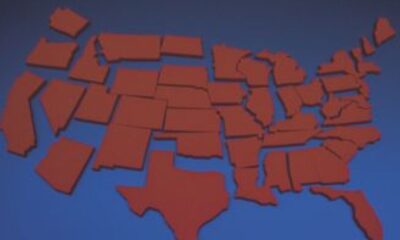DONALD TRUMP won a decisive victory in the presidential contest and is on track to become the first Republican in two decades to win the popular vote. His party also won the Senate and is favoured to regain full control of Congress by retaining the House of Representatives. It could take weeks before his party knows the size of its Senate majority and whether its apparent House victory is confirmed. The final margins in both chambers will set the scope of Mr Trump’s freedom to enact his second-term agenda.
In any event, Mr Trump’s leeway to appoint cabinet members, confirm judges, and influence spending and tax legislation in Congress is likely to be expansive. His victory ratified his iron grip on the Republican Party and the potency of his MAGA ideology and coalition. During his first term and in exile after his defeat in 2020, Mr Trump struggled at times to impose his will; his second term from January will begin with fewer constraints.
Yet sharing power with independent-minded senators and fractious congressmen is a fact of presidential life that even Mr Trump cannot wave away. The Senate has welcomed a slate of Trumpish Republican members in recent years, but remains a bastion of pre-Trump conservatism. The size of the Republican majority in the upper chamber will determine whether moderates like Susan Collins of Maine and Lisa Murkowski of Alaska are able to stifle Mr Trump’s worst impulses, particularly on staffing. In addition to the cabinet, senators must approve more than 1,000 senior jobs, from deputy department heads to generals and ambassadors.
Mr Trump’s campaign to reshape the federal judiciary will also require Senate endorsement. Nothing united Republicans during Mr Trump’s first term quite like his judicial nominations. He enjoyed a Republican-controlled Senate for four years, and under the leadership of Mitch McConnell the body approved 234 of his nominees, including three Supreme Court justices. It is now plausible that an outright majority of the high court will have been chosen by Mr Trump by the time his second term ends.
Mr McConnell, however, will not be leading Republicans next year. On November 13th the Senate will vote in what is currently a three-way race to replace him. John Thune, Mr McConnell’s leadership deputy, is the front-runner. John Cornyn of Texas represents Mr Thune’s biggest threat. Rick Scott of Florida is running a long-shot race from the right. Mr Thune, an establishment figure close to Mr McConnell, once had a rocky relationship with Mr Trump but has since patched it up. He looks likely to become a big figure in haggling between the White House, the House and the Senate.
Key provisions of Mr Trump’s 2017 tax-cutting law will expire in the absence of legislative action next year. Negotiations have yet to begin in earnest, but some battle lines are already being drawn. A Republican-controlled Senate is likely to fight to keep a contentious cap on tax deductions in high-tax states, but if Republicans secure a House majority because of wins in the high-tax states of California and New York, that would prompt a showdown between the two chambers. Congress will also have a say on whether to expand the child tax credit; whether to increase or cut corporate and individual rates; whether to fulfil campaign promises such as removing taxes on tips; and many other measures. On these matters the margins in both chambers will be as important as Mr Trump’s preferences.
The outcome in the House is the biggest unknown. From Alaska to Maine, there are still House races that remain too close to call. The non-partisan Cook Political Report now predicts a very narrow Republican majority in the lower chamber. A House Republican strategist reckons his party could lose one or two seats from its present five-seat majority.
If Mr Trump’s party does hold the lower chamber, House Republicans will have to appoint a speaker, a task that has repeatedly plunged its divided caucus into disarray. The incumbent, Mike Johnson, took the stage with Mr Trump in Palm Beach, just before 2:30am on Wednesday morning. In between praising the MAGA movement and his wife Melania, Mr Trump added, “I want to thank Mike Johnson, I think he’s doing a terrific job. Terrific job.” Any intraparty attempt to oust Mr Johnson will prompt a direct confrontation with Mr Trump, who will clearly have the upper hand after his thumping win.
Yet the probable Republican sweep in this election was a collective effort. After Republicans picked up an expected seat in West Virginia, networks called the Ohio Senate race—the most expensive in the country—for Bernie Moreno, who unseated Sherrod Brown, a three-term Democratic incumbent. The defeat of Jon Tester, a long-serving Democrat in deeply Republican Montana, secured their 52nd seat. And Republicans still have room to increase this new majority. Democratic incumbents remain within one point of their Republican challengers in Nevada and Pennsylvania. The Republicans could have 53 or 54 senators in the 100-seat body once all the votes are counted.
At the time of writing 412 of 435 House races have been called, with Republicans still five seats short of the 218 they need to maintain control of the chamber. At least one race seems destined for a recount, and others will be difficult to call soon.
Once the election is settled, in addition to tax legislation, other fights loom. The lame-duck Congress could pass another in a succession of short-term government-funding bills, but at some point in 2025 Congress will be responsible for a proper budget. And the Senate Armed Services Committee will now be led by a Republican who wants to increase defence spending to 5% of GDP.
Mr Trump has been endowed with plenty of political capital. How to spend it will be a subject of factional arguments, but the direction of travel is clear. ■

 Blog Post7 days ago
Blog Post7 days ago
 Economics1 week ago
Economics1 week ago
 Personal Finance1 week ago
Personal Finance1 week ago
 Finance1 week ago
Finance1 week ago
 Finance1 week ago
Finance1 week ago
 Accounting1 week ago
Accounting1 week ago
 Accounting1 week ago
Accounting1 week ago
 Accounting1 week ago
Accounting1 week ago



















